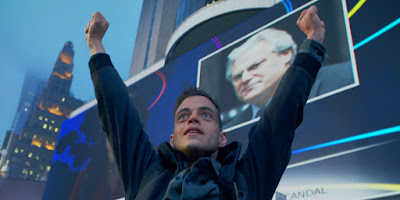Movie Review: 7500
I have always been a fan of films that take place in a single environment, usually focused on a single actor combating a complex situation on his or her own. Films such as 2014’s Locke and 2010’s Buried pit actors like Tom Hardy and Ryan Reynolds against their inner demons and seek to bring out a range of emotions they rarely showcase in other films. Whether they are trapped underground gasping for air or speeding down a dark highway towards reckoning, films of this nature are typically an exercise for not only the actor but the director, writers and other members of the filmmaking process as well. They wrestle with the challenge of balancing their narrative around a single player, one who must provide a compelling performance as the camera is trained on them for the majority of the film. Such was the challenge for 7500, the latest Amazon Prime original thriller starring Joseph Gordon-Levitt as a pilot trapped in the cockpit as deadly terrorists hijack the plane he is flying.
As director Patrick Vollrath’s feature-length directorial debut, 7500 was an ambitious project to undertake. While the film itself was highly minimal, taking place entirely in the cockpit of a plane with a total of seven actors appearing on-screen at various times, I cannot understate the incredible effort the filmmakers put into making a film of this sort. While the plot was nothing truly spectacular, emerging from the era of low-budget action thrillers of the 1980s and ‘90s, it was the claustrophobic setting and effective, anxiety-inducing camera work that set 7500 up as a swift and emotional journey into the headspace of a pilot in crisis. Quickly, the story of a plane hijacking became a contemplation on human behavior and the reactions that can lead someone to either survival or ruin.
Despite the majority of the film’s production being a mix of Austrian and German participants, including its German director, the player at the center of the film’s crisis was American actor Joseph Gordon-Levitt. Known for his supporting roles in major films like Inception and The Dark Knight Rises, Gordon-Levitt has also made a name for himself in numerous starring roles that have seen the actor increasingly challenging his acting style. While he typically comes off as a charismatic every-man, he has portrayed real-life figures like thrill-seeker Philippe Petit and infamous whistleblower Edward Snowden to mild acclaim. His latest role in 7500, a soft-spoken co-pilot who must save a plane full of passengers from a crew of deadly insurgents, allowed the actor to explore what could push a calm, collected professional into a state of desperation, anger and quick-thinking.
While the film spent much of its runtime trained on Gordon-Levitt, as a mix of anger and desperation washes over his character, the conflict between him and one of the terrorists became the basis for the film’s exploration of human behavior. With those closest to him threatened, the emotions and rationality of Gordon-Levitt’s character are tested, driving him to negotiate with the ones seeking to overtake the aircraft. What results is an unnerving duel between not only Gordon-Levitt and the hijackers aboard the plane, but an internal battle for the pilot between doing what he wants and what is protocol in order to save his passengers. He quickly realizes that one of the hijackers, Vedat (Omid Memar), is just a naive teenager following the orders of powerful men above him. The relationship between the two molds into a fairly complicated one, Vedat seeking to finish his mission not out of conviction but out of fear. While much of the dialogue between the two characters involved a lot of fevered yelling at first, the two grow a bond by the conclusion of the film that comes to determine the fate of themselves and the passengers they have on-board. The trials of overcoming fear and choosing what is right tethered the pilot and the young boy together as their fates became intertwined.
The claustrophobic setting of the film fueled not only the complicated bond between the two main characters, but also the boiling uncertainty as the film inched along. As the camera panned feverishly between Gordon-Levitt’s face and the small screen that showed the horrors taking place just outside the cockpit, you never knew exactly when something might go awry. While the first minutes of the film worked to briskly introduce us to the main crew of the plane, as well as hinting at some of the suspicious characters boarding the aircraft, it didn’t waste any time before igniting all-out terror and pitching the story into one of desperate survival. The incredible sense of confinement forced the audience to bear witness to the threat at hand, the camera panning away from the action only to confirm that the plane was still in the air and not plummeting to a fiery demise.
Overall, 7500 never opted to parade the adrenaline-filled heroics of familiar sky-bound thrillers, playing more into the authenticity of realistically dealing with a deadly threat while 30,000 feet in the air. Its star in Joseph Gordon-Levitt didn’t seek to portray a Liam Neeson or Harrison Ford type with his machismo on his sleeve, but rather someone forced to make calculated decisions despite his greatest fears being realized. It was this effective central conflict between right and wrong that kept 7500 flying smoothly.
I gave 7500 a 7 out of 10 because while it emerged as a common-place sky-bound thriller of a fleeting era of film, it anchored itself on the central performance of its main actor and presented a vulnerable and unlikely hero amid a claustrophobic and anxiety-inducing conflict.





Comments
Post a Comment